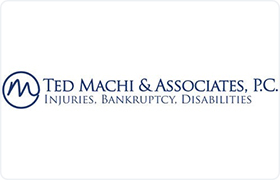Irving Bankruptcy & Debt Lawyer, Texas
Sponsored Law Firm
-
 x
x

Click For More Info:
-
Machi & Associates, P.C.
1521 North Cooper Street Suite 550 Arlington, TX 76011» view mapAccident & Injury, Bankruptcy, Social Secuirty We Fight So You Don't Have To
Our professional team of attorneys and staff provide the experience and expertise needed to effectively handle your case.
800-804-0771
Andrew A. Dunlap
Originally from Denver Colorado, Andrew Dunlap moved to Kansas City and attended Northwest Jr. High and Wyandotte High School. After graduating, he we... (more)
Michael Raymond Cramer
Mr. Cramer grew up in the piney woods of Mt. Vernon, East Texas before moving to Mesquite, where he graduated from High School in 1986. Following high... (more)
Warren V. Norred
✓ VERIFIEDWarren V. Norred is an attorney with experience in bankruptcy, intellectual property and litigation. Mr. Norred earned his Bachelor in Electrical Engi... (more)
Bill Venegoni
Cheryl L. Mann
FREE CONSULTATION
CONTACTDiana S. Weitzel
FREE CONSULTATION
CONTACTPamela L. Wilder
FREE CONSULTATION
CONTACT Ted Machi Arlington, TX
Ted Machi Arlington, TX Practice AreasExpertise
Practice AreasExpertise




